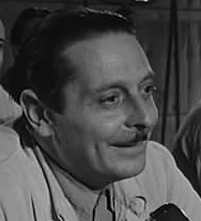Alessandro Blasetti
| Alessandro Blasetti | |
|---|---|

Alessandro Blasetti (1951)
|
|
| Born |
3 July 1900 Rome, Italy |
| Died | 1 February 1987 (aged 86) Rome, Italy |
| Occupation | Film director |
| Years active | 1917−1981 |
Alessandro Blasetti (3 July 1900 – 1 February 1987) was an Italian film director and screenwriter who influenced Italian neorealism with the film Quattro passi fra le nuvole. Blasetti was one of the leading figures in Italian cinema during the Fascist era. He is sometimes known as the "father of Italian cinema" because of his role in reviving the struggling industry in the late 1920s.
Blasetti was born in Rome, where he also died. After studying law at university, Blasetti chose to become a journalist and film critic. He worked for several film magazines and led a campaign for national film production, which had largely ceased by this point. In 1919 he made a brief foray into acting when he appeared as an extra in Mario Caserini's Tortured Soul.
In 1929 Blasetti made his directorial debut with Sun, a fictional story set against the ongoing draining of the Pontine Marshes. The film was well received at a time when there were few Italian films being made. Benito Mussolini described it as "the dawn of the Fascist film". Like many of his early productions, it had elements that were a precursor to neorealism.
The strong reception for Sun, led to Blasetti receiving an offer from Stefano Pittaluga, the only significant commercial producer left working in Italy at the time. Pittaluga had recently converted his Rome studios for sound films. Blasetti directed what would have been the first Italian sound film Resurrection, but delays meant that it was released after Gennaro Righelli's The Song of Love.
...
Wikipedia
